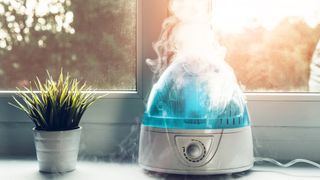Adding humidity to your home can have many positive impacts. It is a balancing act though. Monitoring moisture levels and regular maintenance of your humidifier can ensure you get all of the benefits of moistened air without the risks. Too much moisture in the air can encourage the growth of organisms, including dust mites, and can even lead to mold if left untreated. If you do suffer from too much humidity in your home, check out our guide to the best dehumidifiers (opens in new tab). If it’s dryness you struggle with though, a humidifier has a lot of advantages.
Prevent colds and flu
Humidity allows tiny hairs in the nose to move and do their job of filtering out bacteria and viruses to prevent colds and flu. Added humidity can also help prevent bloody noses. Viruses spread easily when the air is dry. A 2009 study by the National Academy of Sciences (opens in new tab) found a “strong correlation between dry conditions and the transmission and survival of the influenza virus”. This is because droplets of the virus stayed airborne in levels of lower humidity. This makes a lot of sense when you think about it. Flu season coincides with a drop in temperature and humidity every year, so increasing the humidity within your home can prevent the transmission of viruses within your home.
Alleviate flu symptoms
Air moistened with a humidifier can help soothe some symptoms of colds or flu, including irritation of nasal passages, the throat, and bronchial tubes, helping you breathe and sleep easier. Higher levels of humidity can bust congestion in your sinuses, which will enable you to breathe with more ease and clear a blocked nose and painful, dry throat. Running a humidifier overnight will also help you to sleep easier be taking the pressure off your breathing passages as you lie down.
Tackle dry skin
The heat blasting through your home during the winter months can leave skin tight, dry and itchy, especially skin on your hands, which has fewer oil glands. Lips also seem to chap more often and more easily in winter because the skin is more sensitive to environmental changes. Although moisturizers and lip cream can help to manage this, a humidifier can fight the cause of dry skin and help to keep your skin moisture at a comfortable level through the summer months. Your skin can absorb these heightened moisture levels and won’t have to work as hard to stay moisturized.
Add warmth to your home
As temperatures drop, dry air can make even the best space heaters (opens in new tab) work harder. A humidifier will not only fight the dry skin that usually accompanies winter, it will also make your home feel warmer. The humidity in your home should be between 30% and 50%, and if it’s too low the dry air will feel cooler. Conversely, the more moisture that is in the air, the warmer it will feel.
Stop snoring
Low moisture levels in your nose and soft palate can increase snoring, so staying hydrated can be a big help. That includes drinking plenty of water, of course, but adding moisture to the air with a humidifier can also fight off dryness that can lead to snoring. Your throat needs a certain level of moisture in order to produce the best sounds when you do want to speak and prevent the nasal congestion and swelling which can lead to snoring. Keeping the air moist, especially while you sleep, can cut back on snoring.
Reduce static
One sure sign of winter is the first time you pet the cat and get a jarring jolt of static electricity, or when you find the latest missing sock stuck to someone’s shirt or pants. Dealing with an entirely different hairstyle also is no picnic. A humidifier can lessen the potential for static electricity during the winter months. Added static electricity in your home is annoying, and a little comical, but the very real danger to electronic equipment, including your computer, is decidedly unfunny. The chance of significant damage is minimal unless you happen to have your computer open at the time to add RAM, a sound card, or any similar task. The risk is considerable in that case. You could end up with a dead board or other less obvious damage.
Protect your home decor
Wood furniture and flooring responds negatively to too much or too little moisture in the air. Too little moisture can cause wood to split and crack. Adding a humidifier to any room with wood furniture can help preserve the integrity of the wood. Many species of indoor plants originally came from tropical climates with high humidity. Indoor air in many climates, especially in winter, does not offer adequate humidity for the plants to thrive. This will become apparent when leaves get brown at the tips or when they die altogether. Adding a humidifier to a room will make a difference for many plants.












